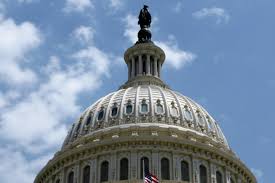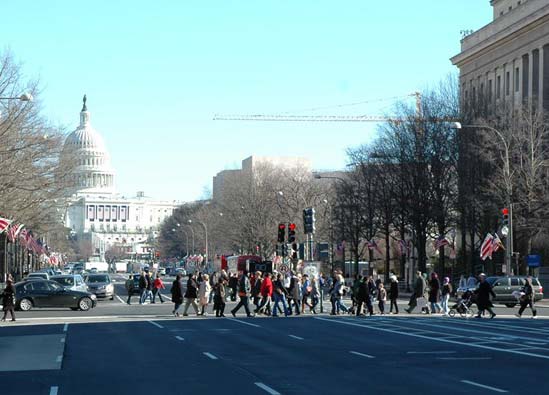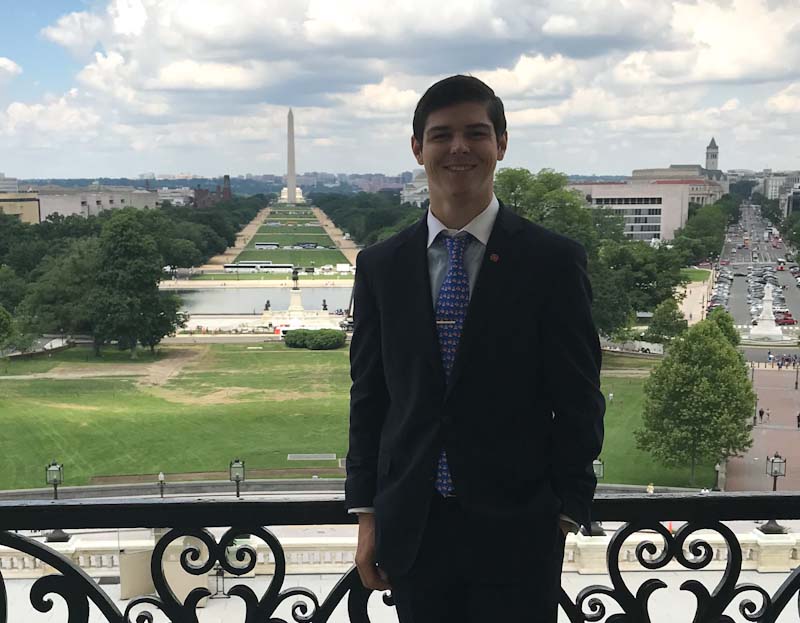A Capitol Experience is More Than a Line on a Resume
A Capitol Experience is More Than a Line on a Resume

A Capitol Experience is More Than a Line on a Resume


Saint Leo has had strong students from University Campus programs attend summer internships in the District of Columbia in previous years. But having four Lions roaming DC in one summer makes for a new record. All have been strong students in political science and pursued experiential learning to help them get a sound start in their prospective fields.
The alumni, in fact, are now working – in paid jobs – in politics for the 2018 elections to start their careers. Their counterparts back at University Campus are delighted to be sharing new insights, especially during discussions in their campaigns and elections political science class.
The official roll call:
 Jeffrey Hawes '18, interned for three months in the Washington, DC, office of Florida's U.S. Representative Gus Bilirakis, a Republican from the district that includes University Campus. Now Hawes has a paid job as campaign manager for Danny Burgess, a Pasco County Republican seeking re-election to the Florida State Legislature on November 6. (Pasco County is home to the Saint Leo University Campus.)
Jeffrey Hawes '18, interned for three months in the Washington, DC, office of Florida's U.S. Representative Gus Bilirakis, a Republican from the district that includes University Campus. Now Hawes has a paid job as campaign manager for Danny Burgess, a Pasco County Republican seeking re-election to the Florida State Legislature on November 6. (Pasco County is home to the Saint Leo University Campus.)
Jeanine Ramirez '20 and MacKenzie Jones '19  were accepted and enrolled as fellows in the Congressional program offered by the National Student Leadership Program. This particular program requires a fee. The undergraduates worked three days a week in offices: Ramirez in the office of Marco Rubio, one of the U.S. Senators from Florida (pictured, seated), and Jones in the office of U.S. Representative Michael Doyle of Pennsylvania. They also performed community service one day at an assigned location, attended other lectures and meetings, and had weekly Bible study sessions, and were invited to networking opportunities with program alumni. Housing arrangements were included in the program. Jones is the only one of the Lions who is not a major in political science, but thrived during the program anyway as she is pursuing the minor Saint Leo offers in American politics. The government and law courses complement her major in social work; she is interested in how social policy and how social workers can advocate for the client populations they serve. Later in the program, she got to spend time in the office of Grace Nelson, who works at a foundation in addition to working for the re-election of her husband, Florida's other U.S. Senator, Bill Nelson.
were accepted and enrolled as fellows in the Congressional program offered by the National Student Leadership Program. This particular program requires a fee. The undergraduates worked three days a week in offices: Ramirez in the office of Marco Rubio, one of the U.S. Senators from Florida (pictured, seated), and Jones in the office of U.S. Representative Michael Doyle of Pennsylvania. They also performed community service one day at an assigned location, attended other lectures and meetings, and had weekly Bible study sessions, and were invited to networking opportunities with program alumni. Housing arrangements were included in the program. Jones is the only one of the Lions who is not a major in political science, but thrived during the program anyway as she is pursuing the minor Saint Leo offers in American politics. The government and law courses complement her major in social work; she is interested in how social policy and how social workers can advocate for the client populations they serve. Later in the program, she got to spend time in the office of Grace Nelson, who works at a foundation in addition to working for the re-election of her husband, Florida's other U.S. Senator, Bill Nelson.
Cassidy Whitaker '18 spent a week in Washington in June as one of only 16 young people selected for the first Young Leaders Initiative, an educational program organized by the American Committees of Foreign Relations (ACFR). The ACFR is a non-partisan, nonprofit confederation of city-based committees active across the United States, including an active committee in Tampa that supported Whitaker's application for leadership program. While she was in Washington, her group attended briefings at the U.S. State Department, the U.S. Institute of Peace (a national, nonpartisan institute founded by Congress), and several different think tanks that conduct research analysis for legislators to consult when creating policy. She began her summer by working for five months (with just a week off for her fellowship) for Republican Amber Mariano's re-election campaign for the Florida Legislature District that includes west Pasco County. Since September, Whitaker has been hard at work as campaign manager for a Democratic candidate for a countywide seat on the Hillsborough County Commission, Kimberly Overman, who has not been elected to public office before. Whitaker noted the campaign also works closely with the Hillsborough County Democratic Executive Committee to support Hillsborough Democrats running in the midterms elections. Hillsborough County includes the city of Tampa.
All the Lions reported being grateful for the work duties they were assigned, whether they were asked to take messages from phone calls from constituents, to give visiting groups tours, or take on other challenges. "I learned how political offices function and the differences between them and campaign offices," said Hawes, noting that he had previously been a volunteer locally for Republican Party of Florida campaign functions. "A lot of it was helping legislative aides," he continued, and in doing that he got to see how legislation is crafted and how aides make presentations about the bills.
He enjoyed an added bonus. Other interns he met steered him toward a master's degree program in political science back home that is suitable for working adults, and he was able to gain admission for the current fall semester. It dovetailed perfectly with the full-time campaign job he obtained partly on the basis of work habits demonstrated during the internship.
 Jones, while working in U.S. Representative Doyle's office (pictured, standing), quite often fielded calls from constituents. It just so happened that she took calls from many people weighing in on a bill that Congressman Doyle co-sponsored to limit the separation of children from families at U.S. borders. The bill was created in response to news that the federal government was separating children from parents in cases where families were entering the U.S. at the southern border, seeking asylum or without documented legal permission. Though the congressman's home district of Pittsburgh and surrounding areas is seemingly far from the issue, his state is home to a federal immigration detention facility that houses immigrant families. All that made the debate over federal policy for detaining such immigrants both a federal and state issue. From Jones' perspective as a future social worker, the situation encompasses both social work problems, government policy, and the connection between the two. She feels the underlying human problems are very sad, but was also gratified to be in a job where she could see alternative courses of action being proposed.
Jones, while working in U.S. Representative Doyle's office (pictured, standing), quite often fielded calls from constituents. It just so happened that she took calls from many people weighing in on a bill that Congressman Doyle co-sponsored to limit the separation of children from families at U.S. borders. The bill was created in response to news that the federal government was separating children from parents in cases where families were entering the U.S. at the southern border, seeking asylum or without documented legal permission. Though the congressman's home district of Pittsburgh and surrounding areas is seemingly far from the issue, his state is home to a federal immigration detention facility that houses immigrant families. All that made the debate over federal policy for detaining such immigrants both a federal and state issue. From Jones' perspective as a future social worker, the situation encompasses both social work problems, government policy, and the connection between the two. She feels the underlying human problems are very sad, but was also gratified to be in a job where she could see alternative courses of action being proposed.
At other times, she was able to sit with legislative staff of the congressman who were taking appointments with advocates of certain causes to hear the point of view of the advocacy group. That exposed Jones to potential career options. "I could see myself in either of those roles in the future, either the policy aide or the advocate."
Jones' weekly community service duties also suited her well. She was assigned to work at a comprehensive social service agency in the district that hosts an umbrella set of services on one campus, from a food pantry and service hub for the homeless, to dental care and counseling for substance abuse disorders. The model impressed her because it is much more convenient for clients than anything she has seen in Florida, she said.
Meanwhile, Ramirez enjoyed working for the staff of Senator Rubio. She was well-prepared academically for the writing assignments that sometimes came her way. For instance, she would be assigned to attend a briefing or testimony on a particular topic, and to summarize the main points in a short document for staff. She learned about environmental problems in another state that resemble policy and water management issues in Florida. She would eventually like to work on crafting government policy and correcting and updating policy as warranted by time and shared experience.
As Ramirez has one more summer ahead before her graduation, she will seek an internship in a different kind of setting next summer and recommends other students apply for a spot in the program she and Jones completed. That program does carry a fee, which can be a financial impediment for many. And living expenses in Washington in general are expensive, all agreed.
Still, she is very positive on the worth of a Washington, DC, experience for anyone interested in a government or policy career. If costs are a barrier, Ramirez recommends students call their Congressional representatives and Senators' offices and ask about possible short-term programs or visits. "You can mail your resume in and the staff will read it and pass it along," she said.
Members of Saint Leo' political science faculty, meanwhile, hope up-and-coming students will learn from the ways these particular students gained during their summer placements. All had experience working in campus events or groups. Hawes helped start a Republican group on campus, for instance; Whitaker was an officer in the political science honor society, as Ramirez is now. And Jones has been active in student affairs even though she is a commuter student. "There are many opportunities at Saint Leo for students to join or start groups, plan programs, and invite speaker to campus," said Frank Orlando, who is currently teaching campaigns and elections, among other courses. He is also an advisor to student groups, and in that role, urges them to create the programming they want to see and to take on the leadership and management roles that will help them learn personal political skills. That kind of work can also expose students to attending meaningful conferences in the region or state, which Saint Leo also encourages.
Longtime political science faculty member Dr. Hudson Reynolds also hopes to see more majors engaging in the experience of politics while they are still at university. "Students who find internships have much more information about which specific career options most interest them intellectually and best suit them personally. When students get to see professionals operating in their own elements, and get to ask questions of them about their backgrounds, they have a better sense of what to pursue next and what else might be a good opportunity."